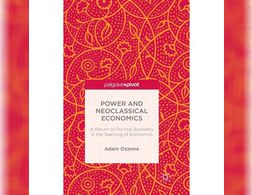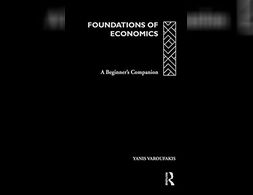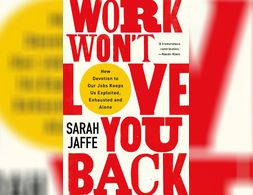✕
1074 results
The book criticizes neoclassical climate economics in the tradition of William Nordhaus. It explains why this kind of thinking is misleading and why neoclassical climate economics asks the wrong questions.
In this ambitious and impressive new book, journalist Howard French seeks to excavate the long elided central importance of the African continent as the “linchpin of the machine of modernity.” In the story of modernity, he writes, the role of Africa is diminished, trivialized, and erased, and by filling in some gaps in this story, he retells the story of modernity.
Adam Smith's The Wealth of Nations provided the first, most influential and lasting explanation of the workings of modern economics. But with his focus on "the market" as the best mechanism for producing and distributing the necessities of life, Smith's concepts only told part of the story, leading to flawed economic models that devalue activities that fall outside of the market's parameters of buying and selling.
This book presents recent thought on market efficiency, using a complex systems approach to move past equilibrium models and quantify the actual efficiency of markets.
Economic theory is currently at a crossroads, where many leading mainstream economists are calling for a more realistic and practical orientation for economic science. Indeed, many are suggesting that economics should be reconstructed on evolutionary lines.
This book is about the application to economics of evolutionary ideas from biology.
This book is about the application to economics of evolutionary ideas from biology.
Debunking Economics - Revised and Expanded Edition exposes what many non-economists may have suspected and a minority of economists have long known: that economic theory is not only unpalatable, but also plain wrong. When the original Debunking Economics was published back in 2001, the market economy seemed invincible, and conventional "neoclassical" economic theory basked in the limelight.
Mainstream economics almost completely ignores the role power plays in determining economic outcomes, which means it can only provide partial explanations of the distribution of wealth and income, and of the problems associated with inequality and poverty.
The book deals with the financial instability hypothesis of Hyman P. Minsky and its application to current developments. The first part of the work summarizes the hypothesis and mentions works elaborating the hypothesis. The second part applies the hypothesis to the financial crisis 0f 2008/09.
This guide contains a collection of recommended YouTube channels and YouTube videos in the fields of economics, business and economic policy.
Foundations of Economics breathes life into the discipline by linking key economic concepts with wider debates and issues. By bringing to light delightful mind-teasers, philosophical questions and intriguing politics in mainstream economics, it promises to enliven an otherwise dry course whilst inspiring students to do well.
This book is about history of monetary economic thought. From the 18th century with Hume and Smith to the early 20th, the author explains the different schools of thought regarding the monetary theories and policies and specially the central banking theory.
In Colonial Debts Rocío Zambrana develops the concept of neoliberal coloniality in light of Puerto Rico's debt crisis. Drawing on decolonial thought and praxis, Zambrana shows how debt functions as an apparatus of predation that transforms how neoliberalism operates.
This is a revolutionary and powerfully argued feminist analysis of modern economics, revealing how woman's housework, caring of the young, sick and the old is automatically excluded from value in economic theory. An example of this pervasive and powerful process is the United Nations System of National Accounts which is used for wars and determining the balance of payments and loan requirements.
Following an unprecedented economic boom fed by foreign investment, the Russian Revolution triggered the worst sovereign default in history. Bankers and Bolsheviks tells the dramatic story of this boom and bust, chronicling the forgotten experiences of leading financiers of the age.
Dani Rodrik reflects in this book on important questions about how economics works and what might be wrong with it. He points out flaws and weakness of the discipline, but also argues that certain criticisms which have brought forward against are without merit. His central point is that there is not just one economic model, but a variety of them and it is important to apply judgment when selecting the most suitable one for a particular situation.
This volume explores the relationship between law and economics principles and the promotion of social justice. By social justice, we mean a vision of society that embraces more than traditional economic efficiency. Such a vision might include, for example, a reduction of subordination and discrimination based on race, religion, gender, sexual orientation, age, disability or class.
hether it's working for free in exchange for 'experience', enduring poor treatment in the name of being 'part of the family', or clocking serious overtime for a good cause, more and more of us are pushed to make sacrifices for the privilege of being able to do work we enjoy. Work Won't Love You Back examines how we all bought into this 'labour of love' myth: the idea that certain work is not really work, and should be done for the sake of passion rather than pay.
In China's Gilded Age, Yuen Yuen Ang maintains that all corruption is harmful, but not all types of corruption hurt growth. Ang unbundles corruption into four varieties: petty theft, grand theft, speed money, and access money.
We use cookies on our website. Click on Accept to help us to make Exploring Economics constantly better!


















